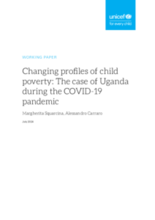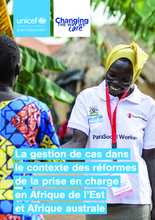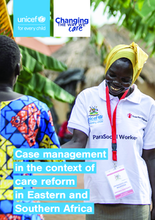Displaying 91 - 100 of 1622
This study examines the socioeconomic determinants of COVID-19-induced poverty among households with children in refugee-hosting districts of Uganda, comparing refugee and host households. It also investigates the role of social assistance in preventing poverty.
The birth of David (not his real name) was regarded as an evil omen.
Este artigo explora o papel da avaliação e gestão de caso no contexto das reformas do sistema de cuidados alternativos. Oferece princípios transversais de boas práticas, as etapas essenciais e descreve os fatores críticos envolvidos nas práticas de avaliação e gestão de caso eficazes. Baseando-se na literatura da região, o artigo visa fornecer uma orientação abrangente aos profissionais e às partes interessadas envolvidas nos cuidados, no bem-estar e na proteção das crianças. O anexo fornece detalhes dos recursos de avaliação e gestão de caso da região da África Oriental e Austral e também em outros lugares.
Ce document explore le rôle de la gestion de cas dans le contexte des réformes de la prise en charge. Il propose des principes transversaux de bonnes pratiques, des étapes essentielles et décrit les facteurs critiques impliqués dans des pratiques efficaces de gestion de cas. S’appuyant sur la littérature de la région, ce document vise à fournir une orientation générale aux professionnels et aux acteurs impliqués dans la prise en charge, le bien-être et la protection de l’enfance. L’annexe fournit des détails sur les ressources en matière de gestion de cas dans la région de l’Afrique de l’Est et australe ainsi qu’au-delà.
This paper explores the role of case management in the context of care reforms. It offers cross-cutting principles of good practice, essential steps, and describes critical factors involved in effective case management practices. Drawing on literature from the Eastern and Southern Africa region and beyond, the paper aims to provide overarching guidance to professionals and stakeholders involved in children’s care, welfare, and protection.
This CPC Learning Network hosted a conversation with partners and faculty affiliates on "Rethinking Child & Youth Participatory Methodologies & Processes: Presentations from our Partner Research Centers in Uganda, Indonesia, and Colombia".
This webinar was a panel conversation hosted by the CPC Learning Network, ChildFund Alliance, the Program on Forced Migration and Health at Columbia University, and the Watchlist on Children and Armed Conflict that brought together a panel of experts to discuss the root causes leading to recruitment and involvement in activities of armed groups as well as the current context in countries such as Sudan, Colombia, Syria, Iraq, Yemen, and more.
This workshop explores why it is important to support care leavers networks, and how these networks can be supported. The workshop was designed and facilitated by care leavers, with presentations from a regional network working across Africa, and networks in Uganda and Zimbabwe.




